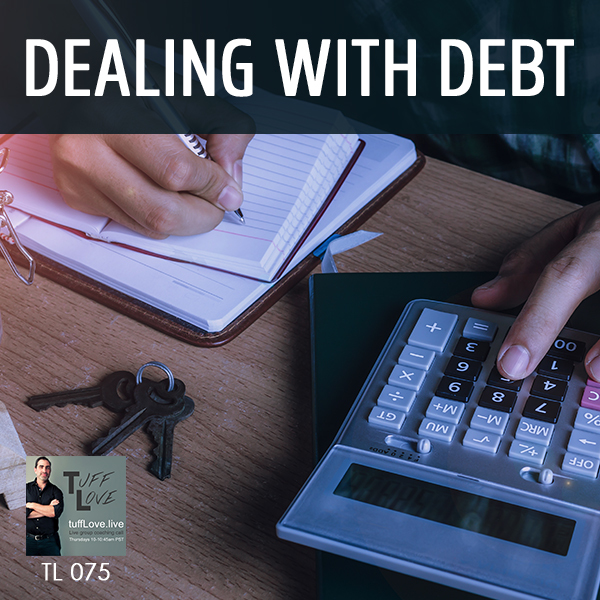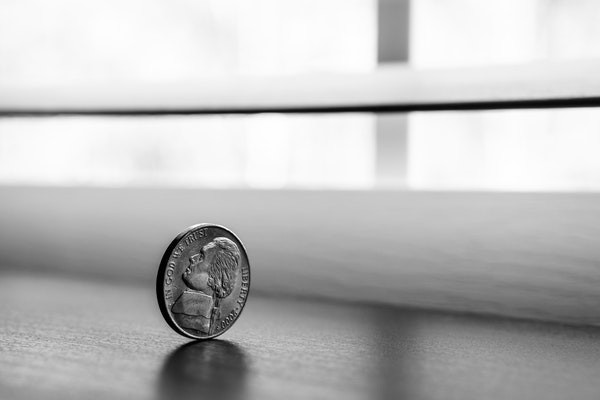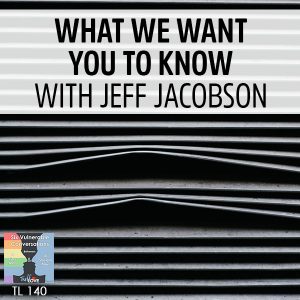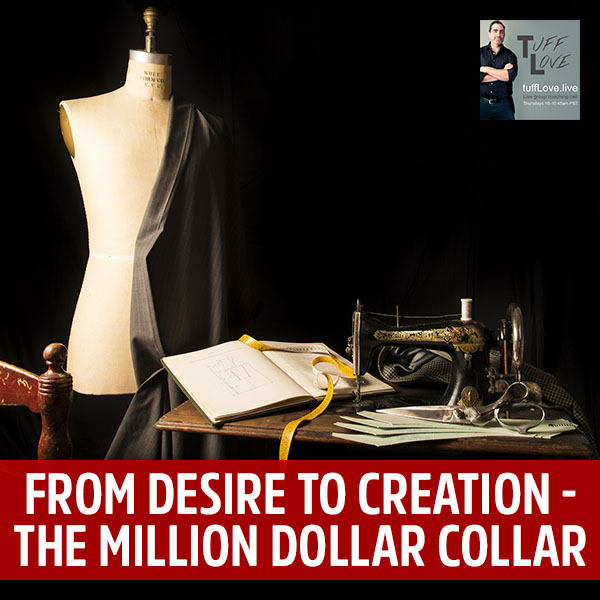
075: Dealing with Debt
Jun 1, 2017
Our concept of debt can be divided into two types. We have conscious debt and unconscious debt. An example of conscious debt is signing up for business loans. We are aware that when we sign our names on the paper, we have to pay back the money on a certain regular basis. The other concept, unconscious debt, affects our lives in ways we may not even realize. A best example of this is our unconscious debt that we owe to our parents. Dealing with debt of this kind means understanding that you were not aware that you did something that you will have to pay for in the future.
—
This show is called Dealing with Debt. That weight that we carry around. Financial, emotion, familial, sexual, all kinds of debt. We kind of swim in debt, whether we’re willing to look at it or not. This show is about the specifics of how to look at it, how to play with it, and how not to fear it. To not let it control you and be willing to really confront and expand yourself around the possibility of being free inside your debt and living alongside your debt. I then invite Chantelle from Texas onto the line, and we have a little slow start but then she starts to see, “I do have a debt-filled relationship with money,” and we talk about some specific things she can do, and then some tips and tricks of how to look her debt right in the eye and actually start to have power over it, rather than it empowering her. For more shows, please visit us a TuffLove.Live. If you’d like, please like us and give us a review on iTunes, it really helps us with expanding the show.
075: Dealing with Debt
This episode’s content is around dealing with debt and this is something that I think most people can really identify with. A lot of people have commented back, that this is a great show. Something that’s really important and also something that’s timely, because debt is something that all of us in the modern world have to deal with and have to find. The ability to consciously deal with debt and not let it run you is a really big part of people’s growth and expansion. The first part will be a rant on the debt and then we’ll bring Chantelle on the line to have a conversation about what she wants to talk about and we’ll go from there.
I did some thinking about this and there’s all different kinds of debt. There’s the obvious ones like bank loans, college loans, credit card debt, there’s all these financial debts that we take on that are really part of life. There’s also many that aren’t so obvious and overt. Those are things like emotional debt, physical debt, family debt which you owe your family, karmic debt, sexual debt when you engage with people sexually, you can take on their energy, but also really take on diseases. There’s all these ways that what we do in the world can bring on a form of debt that we need to handle and need to confront.
I’ll start these into different types. One way to divide them was the concept of overt and covert debt. Another way to look at it was conscious and unconscious debt, debt that we know we’re taking on and debt that we don’t. Some kinds of debt, you know exactly what you’re doing. There’s a contract that you have in terms of the world, in terms of looking at debt. You go to college and you can’t afford it, you’re going to take on a college loan. You’re going to fill out the paperwork, you’re going to see the effect it’s going to have on you for sometimes, many, many years, if not the rest of your life. There is a conscious way that we take on a debt. When I signed up for business loans, that’s something I’ve found was that I was signing away and knowing that I have to pay back this, sometimes on a daily basis. I’ve taken on business loans where they take a $150 out of your account, everyday for nine months.
Don’t recommend those pain in the ass especially when you miss. The point is there’s a conscious level of debt. There’s debt that you know you’re actually putting yourself into. Then there’s also what I call the unconscious debt, and I’ve been thinking more about this. This show is going to be split between the two but there’s a form of the unconscious debt. The unconscious one is when we don’t really know when you do something that you’re going to be taking on debt in the very near future. One of those things I was thinking about is when you’re young and you’re not impenetrable and you’re going to live forever. We do things when we’re young that we have debt later on in the future.
For some that’s simply not paying attention in school or paying too much attention in school or not taking care of our bodies or hanging around with people who have negative influence on our life. There are ways that when we’re young, we take on debt that can last the rest of our lives. There’s also debt around food and bad eating habits. There’s debts in terms of places where we’re not putting attention and it goes both sides, and I was taking notes and thinking about the show. For those who don’t apply themselves when they’re young, there’s debt down the line.
There’s also debt for people who we don’t enjoy themselves, who don’t give them the freedom to be young. I was really one of those persons. I was fourteen years old and felt like I was 30. I was acting my life out like I was already an older man, looking for the responsibilities of life. That debt of not enjoying myself when I was young, came back when I was 30 years old, and totally etch-a-sketch. Already going to Burning Man for the first time and realizing how tight and rigid I had and left created my entire life was one way where I had created a debt of pleasure that came back and really disrupted a lot of things in my life, including my relationship with my family.

Dealing with Debt: There’s a way where there’s both sides of the coin.
I had been so rigid in my process of learning, education, towing the line and being on the straight and narrow that I had created a debt of fun and pleasure. That’s just one thing to think about is that there’s a way where there’s both sides of the coin. It’s if we don’t apply ourselves too much or we apply ourselves with too much rigid intention that can cause debt either way when you grow older. I wrote down, “Did you read the fine prints?” Sometimes on college loans or those daily loans I’ve faced in business, I didn’t quite read the fine print. I know exactly what happened with my business loan, but there was an extra $6,000 that I wasn’t aware of I owe because I didn’t read the fine print. My sales person just kind of glossed over that extra, you know, finance fee of $6,000 for that business set, and in the end, that hurt a lot. Be careful when you go into debt that you’re actually reading some of the fine print and for the conscious side to really pay attention to that piece of the puzzle. Be careful when you play now and pay later on the fine print of what that’s going to occur.
Then there’s this whole concept of unconscious debt. This affects us in our lives more than we’re actually realize how much we do. Just how much we actually take on that debt. We take on the depth of our parents and their expectations. I’m writing this book and I’m writing some abstracts, and one of the chapters is called Honoring your Parents Path but Not Following it Blindly. That’s what I did, I actually blindly followed the path laid out to me by my parents. Now this is not my parents fault, though they were a party of this experience.
This was really my experience. This was really me not willing to do the work to see what the path was that they laid out. A lot of parents put on their children, “Because I raised you, because I provided for you, because I was there for you, etc., you owe me.”This might not be a conscious viewpoint in the parents’ mind, but it could be received by our children. It could be received by our sisters and brothers. There’s a sense that because we did this, that there’s some debt that we owe our family. I think this is one of the most dangerous parts of debts because it’s unconscious, it’s unknown, it’s not talked about, it’s not clear, and because of that there’s a heavy weight that we feel.
We do this in our relationship because we’re boyfriend and girlfriend, there’s now an emotional debt that you owe me. How often do we make contracts? When we break the rules of our exchange, the rules of engagement with our partners, how often do those debts come arise? How often are we arguing about the debt as much if not more than anything else? Our willingness to look at these places where we take on debts consciously or unconsciously or moreover really put debts on the people in our lives. That’s what I really wanted to look at. Look at the places where we’re actually thinking that you owe me because of this.
If I do these seventeen nice things for you, you have to pay me back somewhere down the line. It’s called tit for tat. It’s called commerce. Commerce is in our society, so entwined. No, there are debts when we’re dating. There are assumptions when we date. If I take you out for a nice dinner and a movie, you’re going to take me home and we’re going to have some nooky. There’s all these things that we think about and don’t think about to be engaged and not connected, and so I think it’s important to look at where you have these debts that you’re not clear about, and what’s the effect on you and the effect on your relationships.
I wrote down also in terms of these debts that we’re screwed if we do and screwed if we don’t know. Going back to the analogy of the good student who works really hard at school, compared to not playing. We’re screwed if we work really hard and we’re screwed if we don’t. There’s just this perfect storm that no matter what, we’re actually going to be screwed. We’re actually going to be laden with some form of debt in our lives. There’s the first part of dealing with debt is just to accept that being in debt is part of the human condition, unless you want to live in isolation. I’m sure there’s some kind of debts if you do that as well, but unless you want to live in isolation, there’s going to be some form of karmic, emotional, physical, financial, something debt in your lives.
In some cultures, that’s really insane. From a family in some Asian cultures, the children are expected to take care of the parents. There’s actually an overt agreements in that society that the parents stop working at some age and that’s when the kids take over. My grandfather gave $200 a month to his mother for years and years and years, and, and he hated it. It wasn’t like he had a lot of money, but there was some sort of settled debt, maybe it’s $50 or $50 from each of the kids, I don’t remember the exact numbers. The point is that there’s these physical debts that we take up.
Be willing to move from victim to villain. Click To TweetAs being a member of society, you’re going to have some form of debt, and your way to interact with that is the pathway to your mastery. I wrote down some ways that I think that are really the way to deal with debt. Most of us rue debt, most of us despise debt, most of us are afraid of debt, and I think this is part of the biggest cancer around debt is the anger, the energy, and the victimization that we have around debt. How most are just so scared of our credit card debt, are so scared of our school loans. I’m not going to minimize how challenging these loans are and can be, but my point is, is your ability to actually connect to, and not avoid the debt to confront it, is the most important powerful step that you have. If you have familial debt, if you have your parents, your friends, or your family expecting you to provide something because of your debt, look at that. Look at that and just confront it. Be willing to look at where you’re saying, “No,” where saying, “No mas,” and how does that affect your ability to engage with a debt? This is a second piece, is that you’re not willing to confront it, that’s where the credit card debt grows and grows.
My personal experience was that back 2009, I was building this residential center for One Taste in San Francisco, and we needed to get closets. We made this deal with California Closets to provide like 46 beautiful closets for our rooms. It needed$20,000 to start. Guess what? The business did not have $20,000 in debt. I did have this one Visa though that had $20,000 in room on it because I was a yuppie and at one point the hell out of room, so I just paid for it. I just put $20,000 of my business debt on my credit card.
Then what happened was the business didn’t grow as fast as I thought it was going to go and things got tight, and so I didn’t have any money from the business to help pay my personal credit card. Thing about credit cards is that they don’t really bug you. They’ll send you a note, but they’re actually really happy for large credit card amounts. They like the interest, that’s how they make their money is based on the fees and interest. Basically within, I think it was a year and a half, at $30,000, and I just kept not confronting it for years and eventually they drop $36,000, and I didn’t have the money to pay it. What happened was I asked my parents for help, and they paid it off, and then I paid them at a lower rate, after three years that credit card debt was eliminated.
My point is that I didn’t have the energy, the agency or the maturity to really face that credit card debt. From that, that number ballooned really big. Then the angst that ballooning number every month I would get the statement and be like, “I can’t afford them anymore $600. I’m totally broke, the business is really tight. How do I deal with this?” I would just throw it away month after month or I’ll handle it later and not confront it and there was a cost. My point is turn and face your debt. I have a spreadsheet for my business debt for LA Mother that I know every cent that I owe, and I also have a plan of how to pay it off by this year.
A big number of paid off by this year. I am dedicated to handling my debt in full by the end of year. I hate, I hate, I hate paying every month cash that could go towards the house, which could go to new shoes for Morgan that could go for pleasure for us. I hate that I’m paying that to a company for a business mistake I made in 2016. I can tell you every time that I scratch off that number or color it in my little spreadsheet, there’s a relief. There’s ease inside my soul. There’s some part of me that really just enjoys the ability to handle that every single month. There’s an absolute pleasure and excitement and the ability to knock it off my list. Confront your debt.
Like I said, make a plan. Don’t hide it. Making that plan to pay off my debt will end the year with a really powerful experience for me. It was sort of like, “There’s a big mountain to climb, but just having that plan really caught apart in my mind and turn it from the mystery into the concrete.”My point is make a plan and once you have a plan, it makes things a lot easier. Negotiate that which is unreasonable. When you have debt, there’s actually often a lot of room for you to negotiate. I just negotiated a $78,000 debt down to $4,500 because I’m going to pay all in one lump sum. You might not have the ability to pay large debts off in one lump sum, but you can actually work with the credit companies to help you lower that number.
You can also take the metaphor in things like family. Look at where your family is expecting things from you and negotiate that which is unreasonable. Ask them, “It feels like there’s this expectation you have of me to call once a week, to show up once a month, to pay for you when you get older. I’m not prepared for that and I don’t feel right about that. I don’t feel good about that. Can we talk about it?” I don’t recommend you come from an angst little young person saying, “Fuck you, mom.” I’m saying like, “I recognize this is happening and I want to handle it.”

Dealing with Debt: Whining is great for a period of time but it just costs you energy in the end.
In your relationship, if you feel like some relations how debt, some kind of OCs, some kind of this needs to be done, talk about it. Bring to the surface. Don’t let it fester in the back and get small. Bring it to the forefront. If you’re willing to really look at what’s happening to enable you to have a conscious relationship to that debt. Move from victim to villain. Move from the victimized space into one of control. Paying off his debt this year was really daunting, but I now moved from victim to villain. I said, “The LA Mother debacle is one of my greatest lessons in my life. I’m now paying for it, I’m willing to do it, and I’m not going to whine about it.” Whining is great for a period of time but it just costs you energy in the end. Be willing to move from victim to villain. Finally, celebrate when you pay it off. Celebrate every step of the way. Don’t pay attention to the big overall number that might take two or three years to pay off that student loan, ten years to pay off that credit card, that car or whatever it is, but celebrate the little wins. Really look at yourself and congratulate yourself that you’re willing to move from inert and stuffed into more connected and real.
Be mindful of you and your debt expectations of others. It’s my final thing I’d like to talk about. Be willing to look at where you’re actually creating depth that’s not proper and unreasonable. If you feel like you have that with someone say, “I feel like I have this expectation of you, can we talk about it?” Bring it to the surface, make it real, connect to it and from that there’s a lot of power and clarity. That is this week’s rant ramps.
Live Coaching
I’m now going to bring Chantelle on to the line. How are you?
I’m actually really great.
What can we do that is most optimal for you? How can we best serve you?
Can I just want me to tell you about my life right now?
Tell me what you like to talk about? Tell me about your life.
It’s funny that we’re talking about debt because I actually feel really abundant right now. I have a lot of energy. I’m really passionate about my work and I have a good relationship, friends and community. If you were to ask me seven years ago what I wanted, right now I have everything plus more. The fact is that when I look at my bank account, it’s not reflecting that I’m in debt, and it’s not reflecting what’s happening. It’s not even that I necessarily feel down about it. It’s actually really hard to get upset about my financial status because I feel so good, and I don’t know if it’s because I’m being naïve or avoiding it. It’s just like I put so much energy into work, my passions, and doing what I love, but I’m not getting the returns that I usually am expecting.
I have this idea of what I’m going to be returned and I’m not getting it. Earlier you were talking about other kinds of debt like emotional debt, karmic debt, and stuff like that. It feels like I have some sort of block with money and it feels very confusing because I don’t think of myself as someone who has a negative relationship with money, or I tend to look at money in a very positive way, both of my parents created their own businesses and I didn’t grow up with scarce mentality around money. I’d feel like I spend freely and what I can obviously, and I feel open to receiving money. Maybe I have some sort block though that I’m not seeing? That’s what I got.
Bring it to the surface, make it real, connect to it and from that there’s a lot of power and clarity. Click To TweetI think that is a common thing. I don’t know if this makes you feel better or worse, but I think what you’re describing actually is rather common. I’m happy, I’m joyful, I’m doing what I want to do, I’m passionate, I’m working on my projects, I’m putting energy out, and my bank account is just getting by. I’m just at the point where things are okay, but I don’t have savings and I don’t really have the ability to go out to dinner more than as much as I want to or there’s some level of that. I think that whole experience is really common in our world today. How does this work with you specifically? How do we narrow this down from kind of the worldview into a more specific view? The first thing I would say is, no. You’re just starting this business, right?
I feel like I have a lot of businesses.
Maybe that’s the first challenge. When we multitask, we do keep all parts of ourselves somewhat energized, entertained and satisfied. Every time you go from project to project, from thing to thing, you actually lose energy. In the old days, we used to call it spoke hopping. If imagine the spoke on a wheel, and if you’re moving your way down from the end of the wheel towards the center, and often what we do is we spoke up, we go from one spoke to another because the second spoke seems more entertaining or more rich. We never make it to the center because every time we spoke hop, we actually lose some energy and go backwards. Maybe what you need to do for a period of time until you have the basis of your resources is focus on one project.
That has come up quite a bit. I feel like I’m more narrowed down right now and focused. I still hop back and forth a little bit, but in the past it was super scattered.
That’s the first thing. What I advise businesses, especially new businesses, we build forecasts. These are very mathematically geek forecasts. What they do basically is the top level shows all the possible income, the second section shows the expenses. Then from adding the income minus expenses, you get your net income, which is basically how much money your businesses can make. Content make sense too, right?
Yes.
When I look at someone’s business and I look at their products, especially in the beginning, I say, “Where can you make the most amount of money, with the least amount of energy? We can point those into money products and sexy products. Money products are the ones that pay the rent and the foundation. Sexy products are the ones that turn you on. The point is if you’re focusing mostly on sexy products, that’s when your bank account doesn’t increase. When you’re focusing just on money products, then you actually lose passion and concern. You need to find the ratio between the money and the sexy projects. Where the money have the higher ratio to begin with.

Dealing with Debt: We never make it to the center because every time we spoke hop, we actually lose some energy and go backwards.
That’s interesting because this month is the most broke I’ve been in a really long time and I spent all months being totally consumed by a sexy project. I thought that would actually make me more money.
We call that wishful thinking or sometimes magical thinking. Magical thinking sometimes you do hit oil, where everything flows out. I don’t want to diminish the possibility of that. The wise experienced entrepreneur says, “I have six months now of foundation, runway, or time, that I can make little or no money. This is the time to work on my sexy projects.” If you don’t have that foundation and you’re focusing on products that have a low chance to make money, that’s often where people get in trouble. Cash is the blood of your business and whether we like it or not, cash is the blood that lets us live to feed your son, to feed yourself in all those things. As much as we want to look at money as, you do have to confront it in order to make sure you create flow. You can work on the sexy projects, but just find a balance.
I do notice that I don’t like to confront money either. I hate looking at my bank account. I cringe when I log on to look at my balance. I have student loan debt that I don’t pay just because I don’t have to deal with it. Just today actually, I felt really excited about calling my student loan company and setting up some sort of payment plan with them. I think I want to do that, even though I said for like years and years and years that I was never going to pay back my student loans. I feel excited about doing that today.
Let’s talk about that for a second, we use you as test case dummy, because I think that’s a really common thing. What happens is we’re not going to pay that student loan, like I didn’t want to pay that credit card bill, and then it ends up in the background. That’s still a debt that’s a weight on your shoulders whether you’re willing to confront it or not. That’s an energetic debt. It’s both a financial now and energetic debt. Because some part of you does know that there is a monster in the closet that can screw up a lot of things.
Every now and then it does come back to haunt me, even though I like to think it doesn’t matter. If I just ignore it, it won’t matter. But every now and then there have been occasions where I can’t get approved for something because I have this unpaid debt.
There’s this little thing called the credit score. You might not think that it’s important until you actually go to rent a house you really want, that’s a little bigger or you want to buy a house, God forbid, or you want to invest in a business, all these things come to play. Your credit score is important.
It’s so interesting because for so long I didn’t want to play that game. I was like, “If I just don’t play this stupid game that I didn’t agree to play in the first place, then the universe will reward me. I could find some sort of like hack or loophole out of this game.” What I think I actually want to do is play it, but in my own way, if that makes sense. Part of playing it is confronting all of this stuff.
That’s still a debt that’s a weight on your shoulders whether you’re willing to confront it or not. Click To TweetI’m not saying this is a fun thing, paying taxes it’s not fun. Paying these debts for my business, the business is done. It’s buried. It’s in the grave. There’s dust settling still around it, and I still have another six months of a lot of money that I need to pay to finish this off. My goal is to free myself, so when January 1, 2018 comes around, I can be like, “That was a three year experience for me that taught me so many lessons on so many levels. I’m so grateful for it and I’m so grateful it’s done.”Rather than non-confront it, and then it hits my credit score and shows up inopportune times. One thing I want to ask you also is what is the specific fear of opening up your bank account? What comes up for you and what’s the block?
Seeing how much money I’ve spent. It’s like not wanting to know that I can’t pay my rent, which I can’t actually like I already know what’s in my bank account. I can’t. I can now, I got it taken care of, but like whatever. It’s like just not wanting to see how much I spend and because I know when I look at my bank account, I’m going to have to face the amount of money I have, and then do something about it. Whereas if I don’t know the number in my account, then I can sort of just keep moving through life, pretending I’m okay and I have enough then.
I think it’s the same thing. It creates a lot of energy. That fear is costing you up. Did you ever hear the term opportunity costs? Opportunity costs, basically in business you have two options, door number one or door number two, and both could be lucrative. Do I have enough energy, time, money, or staff to enter one door? The opportunity cost of entering door one is not going to door number two, the profits and the money from door number two. It’s just fine, it happens all the time. You have to make these decisions, but being aware of your opportunity costs and businesses, to analyze which is the best for the business, one or two.
In terms of how much energy we spend non-confronting our money, that’s a huge opportunity cost because we’ve spent a lot of time and energy saying, “There’s no mess behind that closet.” We spend a lot of time and energy doing that. I have a suggestion for you that you’re going to hate. There’s a software program called Quicken. Quicken downloads all your transactions from your banks, credit cards, and PayPal, etc. It then, you get to categorize it and then look on a daily, five daily, weekly, every other week, and monthly basis of where you’re spending.
It’s an app or software. Can I get it as an app?
There’s Mint.Com which is on the web, which I didn’t like as much as Quicken, so there’s Mint.Com. Then there’s Quicken, which I love as an accountant’s guy because of the flexibility. You can try Mint for free, or you could try Quicken. I recommend Quicken personally. It is an application on my computer. I don’t know if there’s actually an app for it. Just try it out for two months and see if your life improves or it doesn’t improve. I think your life would improve while you’re confronting this piece.
I think so too. I went and applied for a loan. I mean that just puts me in more debt so I don’t know how good or bad that is. It feels really good because now I have a bunch of money and I owe it all back. It’s kind of confusing. I’m trying to look at it as a positive thing and being really deliberate about paying it back. It just made me realize like, “I want to confront all of my debt and start paying that back a little bit at a time.”

Dealing with Debt: An unconscious loan is a detrimental thing. Be conscious around it, pay attention to it.
I’m with you. My people hold debts and use debts. I’ve used debts my entire life. I’ve used loans to advance my life. OneTaste was in debt up the top of our heads, and then after a long time and a lot of patience, we actually built it into a seven figure, very profitable business. To me, loan is never a bad thing. To me, an unconscious loan is a detrimental thing. Be conscious around it, pay attention to it. Add that to your little Quicken. My point is confront it. Then get yourself out of this hole you’re in, and then hopefully you’ll never need a loan again, but maybe you do. Maybe you want to build a business that requires $100,000 in loans. Maybe you have a great idea, you and your partners. I don’t know exactly what it is, so loans are not bad. Unconsciousness behavior around loans to me is a toxic behavior.
I’ve never taken out a loan before. I always had the idea that it was bad, but now feels it feels pretty good.
That’s in our culture because most of us are unwilling to confront it. We think the loan is debt on some level, but if you’re willing to confront it, it could be the smartest thing possible. Thank you so much for being on the show.
Thanks.
Go forth. Confront your money. Download Quicken. Just do it. I know it’s going to be painful, but just do it. It nearly helped. This is what I do for a living. I help people deal with their little boxes. We can break through your little box around debt and take it to the next level. That’s it. Go forth, be merry. I’ll see you next week. Thanks so much. I love you.
Thank you so much Chantelle for being so vulnerable and real on the show. What an amazing gift to give to all the listeners of just being alive and letting us into your world so we can see our part, how we identify and what we can do to deal our own debt. If you’d like to help out the show, please be our sponsor. Visit Patreon.Com/TuffLove and be one of our monthly subscribers, we really appreciated it. That’s it, go forth, be real, have fun. I love you, take care.
Resources mentioned:
Podcast: Play in new window | Download







